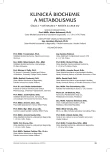-
Medical journals
- Career
Postanalytical phase and interpretation of laboratory tests
Authors: T. Šálek 1,2; J. Franeková 3,4; A. Jabor 3,4; B. Friedecký 5
Authors‘ workplace: obojí Hradec Králové ; Fakultní nemocnice Hradec Králové ; Katedra biomedicínských oborů, Lékařská fakulta, Ostravská Univerzita v Ostravě, Ostrava 1; Oddělení klinické biochemie, Krajská nemocnice T. Bati, a. s., Zlín 2; Pracoviště laboratorních metod, IKEM, Praha 3; 3. lékařská fakulta Univerzity Karlovy, Univerzita Karlova v Praze, Praha 4; Ústav klinické biochemie a diagnostiky, Lékařská fakulta Univerzity Karlovy v Hradci Králové, Univerzita Karlova v Praze 5
Published in: Klin. Biochem. Metab., 24, 2016, No. 2, p. 82-87
Overview
The total testing process consists of five phases: pre-preanalytical (test selection), preanalytical, analytical, postanalytical and post-postanalytical (clinical work with laboratory test results). The major tools of postanalytical and post-postanalytical phases are: reference ranges, cut-off and action points, calculation of important indicators and graphic visualization, autovalidation, interpretative comment, reflexive and reflective testing, clinical examination of the patient with record in documentation, reporting of critical values and effective transmission of laboratory test results by laboratory information systems. The European Federation of Clinical Chemistry and Laboratory Medicine proposed quality indicators of postanalytical phase. The post-postanalytical phase currently has a great potential to be an important part of clinical biochemistry and other disciplines of laboratory medicine.
Keywords:
harmonization; patient safety; post-analytical phase; post-post-analytical phase; quality indicators; interpretative comment.
Sources
1. Lippi, G., Banfi, G., Church, S. et al. Preanalytical quality improvement: in pursuit of harmony, on behalf of European Federation for Clinical Chemistry and Laboratory Medicine (EFLM) Working group for Preanalytical Phase (WG-PRE). Clin. Chem. Lab. Med., 2014, 53: p. 357–370.
2. Friedecký, B. Kvalita v klinické laboratoři a bezpečnost pacientů. Klin. Biochem. Metab., 2010, 18 (39): p. 136–143.
3. Lippi, G., Plebani, M. Laboratory medicine does matter in science (and medicine)… yet many seem to ignore it. Clin. Chem. Lab. Med., 2015, 53: p. 1655–1656.
4. Hawkins, R. Managing the pre - and post-analytical phases of the total testing process. Ann. Lab. Med., 2012, 32: p. 5–16.
5. Cerriotti, F., Hinzmann, R., Panteghini, M. Reference intervals – the way forward. Ann. Clin. Biochem., 2009, 46: p. 8–17.
6. International society of nephrology. KDIGO 2012 clinical practice guideline for the evaluation and management of chronic kidney disease. Kidney Int. Suppl., 2013, 3: p. 1–150.
7. Česká nefrologická společnost ČLS JEP a Česká společnost klinické biochemie ČLS JEP. Doporučení k diagnostice chronického onemocnění ledvin. Klin. Biochem. Metab., 2014, 22 (43): p. 138–152.
8. American diabetes association. Standards of medical care in diabetes. Diabetes Care 2016, 39 (Suppl 1): S1–S112.
9. Česká diabetologická společnost ČLS JEP a Česká společnost klinické biochemie ČLS JEP. Doporučení odborných společností - aktualizace: Diabetes mellitus - laboratorní diagnostika a sledování stavu pacientů. Klin. Biochem. Metab., 2016, 24(45): p.39-50.
10. Thygessen, K., Alpert, J. S., Jaffe, A. S. et al. Third universal definition of myocardial infarction. Eur Heart. J., 2012, 33: p. 2551–2567.
11. Friedecký, B., Jabor, A., Kratochvíla, J. et al. Doporučení ČSKB: používání kardiálních troponinů při podezření na akutní koronární syndrom. Klin. Biochem. Metab., 2015, 23 (44): p. 71–77.
12. Salinas, M., López-Garrigós, M., Flores, E., Leiva-Salinas, M., Ahumada, M., Leiva-Salinas, C. Education and communication is the key for the successful management of vitamin D test requesting. Biochem. Med. (Zagreb) 2015, 25: p. 237–241.
13. Senčík, P.(jr), Franeková, J., Komínková, M. et al. Interference dobutaminu při stanovení analytů s využitím Trinderovy reakce. Klin. Biochem. Metab., 2012, 20 (41): p. 17–30.
14. Hiemke, C., Baumann, P., Bergmann, N. et al. AGNP consensus guidelines for therapeutic drug monitoring in psychiatry: update 2011. Pharmacopsychiatry 2011, 44: p. 195–235.
15. Verboeket-van de Venne, W. P. H. G., Aakre, K. M., Watine, J., Oosterhuis, W. P. Reflective testing: adding value to laboratory testing. Clin. Chem. Lab. Med., 2012, 50: p. 1249–1252.
16. Laposata, M. Putting the patient first – using the expertise of laboratory professionals to produce rapid and accurate diagnoses. Lab. Med., 2014, 45: p. 4–5.
17. International standardisation organisation. ISO 15189 : 2012 Medical laboratories – requirements for quality and kompetence. Geneva: International standardisation organisation, 2012. (Úřad pro technickou normalizaci, metrologii a státní zkušebnictví. ČSN EN ISO 15189 : 2013 Zdravotnické laboratoře – požadavky na kvalitu a způsobilost. Praha: Úřad pro technickou normalizaci, metrologii a státní zkušebnictví, 2013.)
18. Plebani, M. Laboratory errors: how to improve pre - and post-analytical phases? Biochem. Med. (Zagreb) 2007, 17: p. 5–9.
19. Plebani, M., Astion, M. L., Barth, J. H. et al. Harmonization of quality indicators in laboratory medicine: a preliminary consensus. Clin. Chem. Lab. Med., 2014, 52: p. 951–958.
20. Watson, I. D., Siodmiak, J., Oosterhuis, W. P. et al. European views on patients directly obtaining their laboratory test results. Clin. Chem. Lab. Med., 2015, 53: p. 1961–1966.
Labels
Clinical biochemistry Nuclear medicine Nutritive therapist
Article was published inClinical Biochemistry and Metabolism

2016 Issue 2-
All articles in this issue
- Chips and Capillary Electrophoresis Based Immunoassays
- The verification of the applicability of NPHS2/SYNPO ratio for diagnosis of FSGS and MCD
- Activity of phosphomannomutase 2 in patients with suspected congenital disorder of glycosylation
- Quality, control and validation of glucometers and CGM systems. Status overview
- Postanalytical phase and interpretation of laboratory tests
- Changes in Paraoxonase 1 activity and concentration of conjugated dienes in connection with number of metabolic syndrome components
- Clinical Biochemistry and Metabolism
- Journal archive
- Current issue
- Online only
- About the journal
Most read in this issue- Quality, control and validation of glucometers and CGM systems. Status overview
- Postanalytical phase and interpretation of laboratory tests
- Activity of phosphomannomutase 2 in patients with suspected congenital disorder of glycosylation
- The verification of the applicability of NPHS2/SYNPO ratio for diagnosis of FSGS and MCD
Login#ADS_BOTTOM_SCRIPTS#Forgotten passwordEnter the email address that you registered with. We will send you instructions on how to set a new password.
- Career

